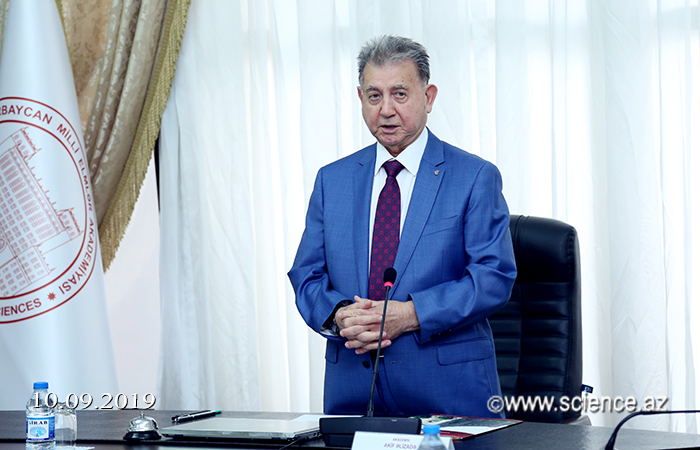
ANAS Presidium has held a meeting with chairmen of scientific councils on research directions on September 10, which brought together vice-presidents of ANAS, academic-secretaries and council chairmen.
Opening the event, the president of ANAS, academic Akif Alizadeh said that the main purpose of the scientific councils of the Academy for many years was to execute the decisions made on the development of science, train new, highly qualified staff and form the priority scientific directions.
Akif Alizadeh recalled the main tasks facing the Coordination Council of Scientific Research of the Republic of Azerbaijan, established by the decision of the Cabinet of Ministers last year. He said that scientific councils on scientific directions have been created and chairmen have been appointed to ensure implementation of these tasks. The scientist said that the scientific councils would then operate in about 40 new scientific directions and gave specific instructions to the scientific councils in order to achieve more effective results in these areas.
“Each topic must be taken into account for its novelty, relevance and scientific significance. In this regard, responsible persons must be active, make new proposals, and be responsible for every scientific work”, he noted.
The scientist added that currently, a draft regulation on accreditation of scientific institutions operating in the country is being developed with the participation of ANAS.
Then academicians Irada Huseynova, Ahliman Amiraslanov, Kamal Abdullayev, Rafael Huseynov, Shahin Mustafayev, corresponding members of ANAS Bilal Bilalov, Bakhtiyar Aliyev, Musa Gasimli, Akif Musayev and Nuru Bayramov made speeches.
The meeting discussed the development of an electronic database of dissertation topics, the creation of web sites of the councils and their operation, the coordination of scientific research in scientific and higher education institutions of the Republic, and the elimination of duplication in scientific research. The sides also exchanged views on the formation of the scientific councils, approval of their exemplary draft regulations and the organization of their future activities.